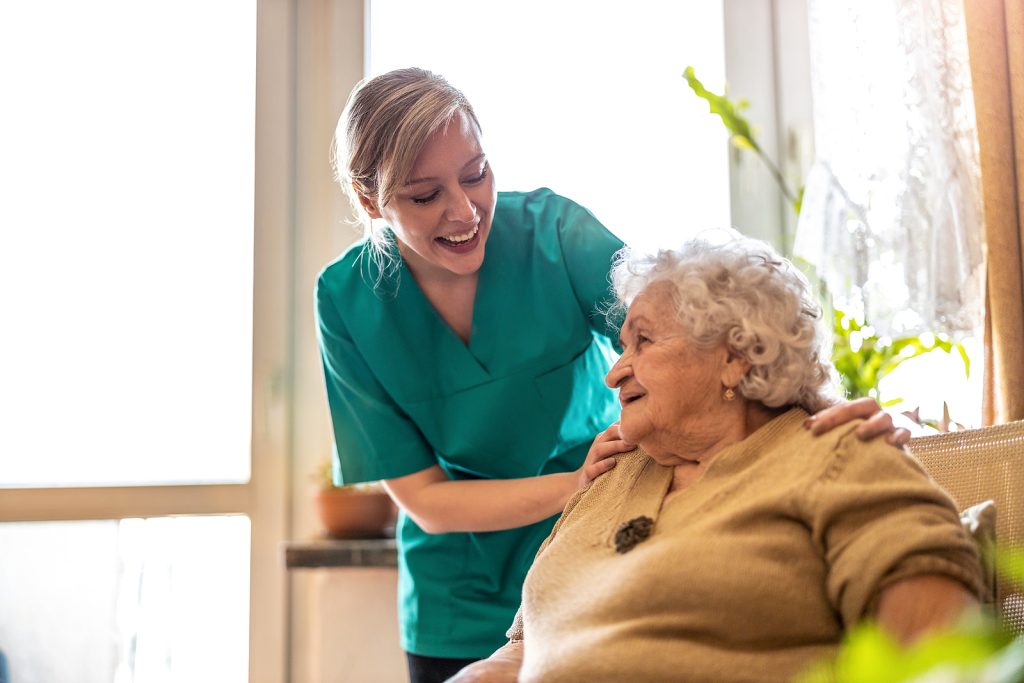

Caring for Alzheimer’s patients is challenging at every stage, but as cognitive decline starts to impact memory and verbal communication even more, those challenges get much bigger for families. One of the ways to cope with these difficulties is through physical touch and connection. Alzheimer’s care providers can help families learn more about how to use physical touch effectively with their senior Alzheimer’s patients.
Reducing Anxiety and Agitation
Touch can be so important for Alzheimer’s patients because it’s reassuring. It helps to reduce anxiety and agitation when seniors are confused. Gentle hugs, a light touch on the arm, and similar types of touch can help people with Alzheimer’s disease to feel calmer and safer. These touches can also help family members to feel less anxious.
Improving Emotional Well-being
Physical touch releases chemicals in the body. One of the most important hormones released through touch is oxytocin. Sometimes called the “love hormone” or the “bonding hormone,” oxytocin lowers stress, builds connections, and improves moods. For patients with Alzheimer’s disease, that means that oxytocin helps them to feel connected and valued, which is so important for everyone.
Enhancing Non-verbal Communication
Because Alzheimer’s disease affects verbal communication, physical touch is a non-verbal way to convey intentions and information. Simple gestures like a pat on the back or a light massage can help family caregivers show seniors that they’re loved and understood. Gentle touch is also a good way to get an Alzheimer’s patient’s attention to talk with them or share information.
Stimulating Memory
Touch of all types can help to evoke memories and the emotions that go with them. Familiar sensations like holding a favorite stuffed toy, receiving a hand massage, or touching something soft like clothing or a blanket help seniors to remember happier times. Family caregivers may want to experiment with different ways to stimulate memories for seniors through touching various items.
Practical Ways to Use Touch
Home care providers can help families learn to use touch effectively with senior Alzheimer’s patients. Familiar gestures like holding hands or placing a hand gently on their shoulder or arm offer comfort and are easy ways to guide seniors. Alzheimer’s care providers can also help families to create routines that are calming and comforting. Hand massages are comforting, but can also make it easier to care for senior’s nails, for instance. Other calming routines that incorporate touch could include brushing hair and pairing touch with music to evoke memories and encourage movement. The exact types of activities and touch may vary from one patient to another depending on the patient’s needs.
Touch is such an easy way for families to connect with seniors who have Alzheimer’s disease. Gentle touch works with other non-verbal cues to comfort seniors and offer them emotional support and connection. Alzheimer’s care providers know how complicated it is to cope with the changes that loved ones experience as Alzheimer’s disease progresses. They can help families find tools and resources that help to make communication easier while supporting seniors battling Alzheimer’s disease.
Reference
https://www.alz.org/help-support/caregiving
If you or an aging loved one are considering Alzheimer’s care in Alpharetta, GA, please contact the caring staff at Assisting Hands – Serving Forsyth and North Fulton County today at 770-626-5150|
Assisting Hands – Serving Forsyth and North Fulton County provides exceptional home care in Buckhead, Dunwoody, Sandy Springs, Roswell, Alpharetta, Johns Creek, Milton, Cumming, Gainesville, Suwanee and the surrounding areas in Georgia.
